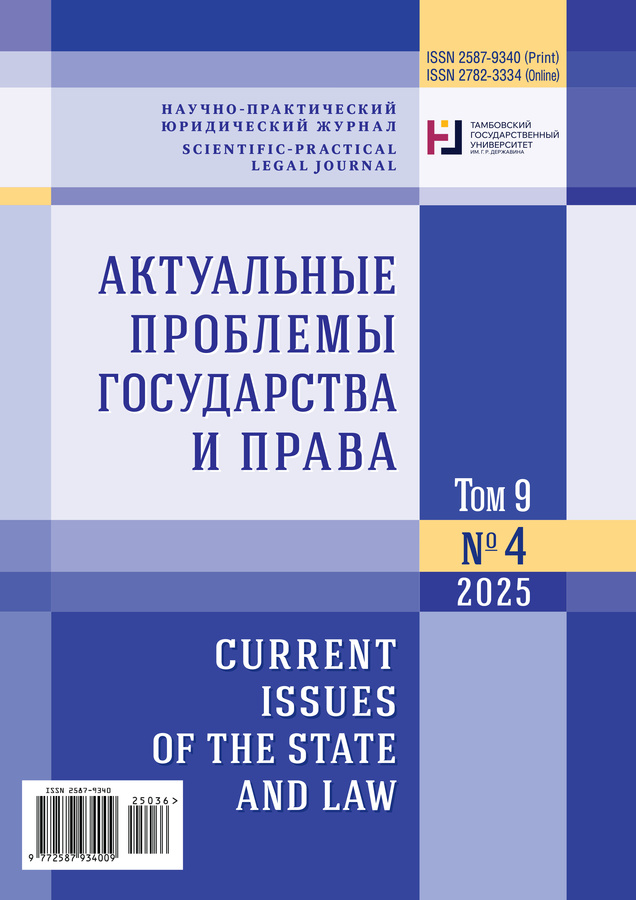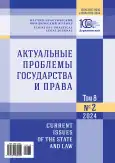Баланс публичных и частных интересов в осуществлении экологической функции государства и обеспечении экологической безопасности: теоретико-правовые аспекты
- Авторы: БРОСАЛИНА А.А.1
-
Учреждения:
- ФГБОУ ВО «Тамбовский государственный университет им. Г.Р. Державина»
- Выпуск: Том 8, № 2 (2024)
- Страницы: 166-176
- Раздел: Общая теория и история права и государства
- URL: https://journal-vniispk.ru/2587-9340/article/view/297456
- ID: 297456
Цитировать
Аннотация
Активное развитие рыночной системы хозяйствования в Российской Федерации в качестве неотъемлемой задачи ставит поддержание конкурентоспособной экономической деятельности. В этих условиях объективной реальностью является осуществление негативного воздействия на окружающую среду. Поэтому в числе важнейших национальных приоритетов, признаваемых в России, находится обеспечение двух жизненно важных состояний – состояния экономического роста и состояния экологического благополучия. Целью настоящей статьи является теоретико-правовой анализ проблемы обеспечения баланса публичных и частных интересов в осуществлении экологической функции государства и обеспечении экологической безопасности. На основе доктринальных подходов обозначено соотношение категорий «интерес», «публичный интерес», «частный интерес» и «баланс интересов». Проанализированы подходы к пониманию соотношения экологических и экономических интересов, а также выявлены позиции, отраженные в конституционно-судебной практике. Установлено, что в целях реализации парадигмы устойчивого развития необходимо достижение взаимосвязанных экономических и экологических целей, а также преодоление коллизий между экономическими правами и свободами и требованиями, направленными на обеспечение охраны окружающей среды. Акцентировано внимание на категориях «экологический комплаенс» и «экологический лоббизм». Сделан вывод о недостаточной степени закрепленности частноправовых средств воздействия на участников экологических отношений в законодательстве, что препятствует полноценной реализации «зеленой» экономики и стимулированию добросовестного поведения хозяйствующих субъектов.
Об авторах
Александра Александровна БРОСАЛИНА
ФГБОУ ВО «Тамбовский государственный университет им. Г.Р. Державина»
Автор, ответственный за переписку.
Email: brosalina2001@mail.ru
ORCID iD: 0000-0001-5444-1555
преподаватель кафедры конституционного и международного права Института права и национальной безопасности
392000, Российская Федерация, г. Тамбов, ул. Интернациональная, 33Список литературы
- Егорова М.А. Принципы эколого-правового регулирования «зеленой» экономики в условиях цифровиза-ции и защиты конкуренции // Журнал Сибирского федерального университета. Гуманитарные науки. 2022. № 12. С. 1881-1891. https://doi.org/10.17516/1997-1370-0959, https://elibrary.ru/mjyzll
- Садовникова Г.Д. «Зеленая» энергетика: конституционно-правовые векторы развития // Образование и право. 2023. № 9. С. 52-56. https://doi.org/10.24412/2076-1503-2023-9-52-56, https://elibrary.ru/gdqseg
- Ябдулганов А.А. «Зеленая» функция налогового права // Вестник университета имени О.Е. Кутафина. 2023. № 7 (107). С. 116-129. https://doi.org/10.17803/2311-5998.2023.107.7.116-129, https://elibrary.ru/lcuqca
- Жаворонкова Н.Г., Агафонов В.Б. Трансформация экологического права: теоретико-правовые аспекты // Вестник Томского государственного университета. Право. 2021. № 41. С. 149-158. https://doi.org/10.17223/22253513/41/13, https://elibrary.ru/yxyyrz
- Южаков В.Н., Спиридонов А.А. Клиентоцентричность государственного контроля: ориентация на баланс интересов сторон // Государственная служба. 2023. № 2 (142). С. 13-28. https://doi.org/10.22394/2070-8378-2023-25-2-13-28, https://elibrary.ru/lixjin
- Белоусов Н.В. Вклад Конституционного суда Российской Федерации в формирование конституционно-отраслевой концепции интересов // Право и практика. 2023. № 4. С. 64-70. https://doi.org/10.24412/2411-2275-2023-4-64-70, https://elibrary.ru/yhbmuv
- Фархутдинов Р.Д. Пределы публичного экономического интереса в коммерческой сделке в цифровой экономике: понятие, межотраслевые связи, проблемы правового регулирования // Вестник экономики, права и социологии. 2020. № 2. С. 121-123. https://elibrary.ru/ycpkls
- Scassa T. Interests in the Balance // In the public interest: The future of Canadian copyright law. Toronto: Irwin Law, 2005. P. 41-65.
- Sartor G. The right to be forgotten: balancing interests in the flux of time // International Journal of Law and In-formation Technology. 2016. Vol. 24. Issue 1. P. 72-98. https://doi.org/10.1093/ijlit/eav017
- Даньков А.А. Обеспечение баланса публичных и частных интересов в сфере правосудия: автореф. дис. … канд. юрид. наук. М., 2014. 35 с. https://elibrary.ru/zpmnjf
- Бакаева О.Ю., Погодина Н.А. О соотношении частных и публичных интересов // Журнал российского права. 2011. № 4 (172). С. 36-47. https://elibrary.ru/mhqvkj
- Архипова Е.Ю. Баланс частных и публичных интересов при правовом регулировании // Актуальные про-блемы государства и права. 2022. Т. 6. № 2. С. 132-139. https://doi.org/10.20310/2587-9340-2022-6-2-132-139, https://elibrary.ru/tqgogc
- Фетюков Ф.В. Баланс частных и публичных интересов в сфере исследований генома человека // Российское право: образование, практика, наука. 2023. № 6. С. 35-42. https://doi.org/10.34076/2410_2709_2023_6_35, https://elibrary.ru/wyuzue
- Завгородняя А.А. Научный дискурс о балансе интересов в праве // Актуальные проблемы государства и права. 2022. Т. 6. № 4. С. 512-522. https://doi.org/10.20310/2587-9340-2022-6-4-512-522, https://elibrary.ru/vxecdz
- Васянин Г.М., Кузнецов Д.А. Баланс частных и публичных интересов при пользовании недрами, земель-ными участками и в случаях изъятия земельных участков для целей недропользования // Юридическая наука. 2023. № 12. С. 112-117. https://elibrary.ru/sbevjt
- Абанина Е.Н., Петров Д.Е. Политика государства в сфере устойчивого развития: поиск баланса интере-сов // Правовая политика и правовая жизнь. 2023. № 3. С. 59-67. https://doi.org/10.24412/1608-8794-2023-3-59-67, https://elibrary.ru/dnmosk
- Ронжина Н.А. Правовое обеспечение экологической безопасности: глобальные, национальные и инте-грационные аспекты // Ученые записки Санкт-Петербургского имени В.В. Бобкова филиала Российской таможенной академии. 2019. № 4 (72). С. 74-79. https://elibrary.ru/yryxba
- Кодирзода М.А. Некоторые проблемы экологической функции государства // Вестник Таджикского госу-дарственного университета права, бизнеса и политики. Серия общественных наук. 2021. № 4 (89).
- С. 114-121. https://elibrary.ru/sxgxju
- Боголюбов С.А. Соотношение публично-правовых и частноправовых средств в обеспечении экологиче-ских прав граждан // Журнал российского права. 2005. № 7 (103). С. 24-32. https://elibrary.ru/ndfcbe
- Дубовик Д.М. Экологический комплаенс как инструмент развития «зеленого» предпринимательства // Теоретическая и прикладная юриспруденция. 2022. № 4 (14). С. 39-44. https://doi.org/10.22394/2686-7834-2022-4-39-44, https://elibrary.ru/cdlogx
- Белянская О.В. и др. Трансформация институтов публичной власти в современной России / отв. ред. Н.Е. Садохина. Тамбов: Изд. дом «Державинский», 2023. 252 с.
- Булгаков В.В., Бросалина А.А. Экологический комплаенс: понятие, особенности, роль в снижении эколо-го-правовых рисков и обеспечении экологической безопасности // Вестник Томского государственного университета. Право. 2023. № 50. С. 117-131. https://doi.org/10.17223/22253513/50/9, https://elibrary.ru/vzjbts
- Зелепукин Р.В. Лоббирование в экологической сфере: практические аспекты экономических и экологиче-ских интересов // Аграрное и земельное право. 2020. № 5 (185). С. 54-57. https://elibrary.ru/qtvoey
- Посульченко В.А. Экологический лоббизм как индикатор развития гражданского общества // POLITBOOK. 2020. № 2. С. 24-41. https://elibrary.ru/kujwwt
- Зелепукин Р.В. Лоббирование как инструмент согласования социальных интересов: к вопросу о перспек-тивах правового регулирования // Актуальные проблемы государства и права. 2017. № 2. С. 125-135. https://elibrary.ru/zukwhz
Дополнительные файлы









